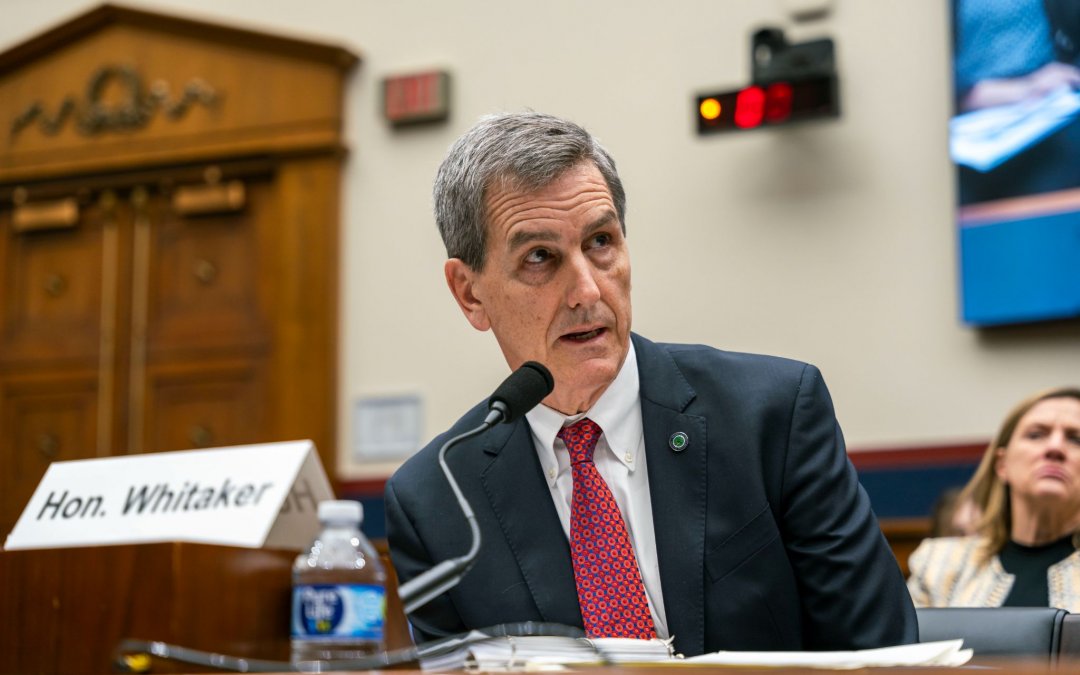WASHINGTON – Representatives on the House Transportation Committee grilled Federal Aviation Administrator Michael Whitaker Tuesday about air traffic controller shortages, near misses and the blowout of a door panel midflight on a Boeing 737 MAX 9 jet on an Alaska Airlines plane.
Since Whitaker began in October, his agency has faced closer scrutiny over concerns about quality control, oversight of the manufacturing process and safety culture at Boeing. His testimony is the first in what promises to be a series of hearings about air safety and manufacturing. After his testimony, the National Transportation Safety Board released a preliminary report on Tuesday, saying that all four bolts that plug the door into the fuselage were missing before the Alaska Airlines flight took off.
On Tuesday, Whitaker called controller fatigue his “top concern,” adding that his administration hired a panel of fatigue experts to review sleep needs for those in the job. With shifting schedules and overtime requirements, the agency has faced a shortage of 1,000 fewer controllers than it did a decade ago.
He said the FAA can’t reevaluate processes and work toward a healthier workplace environment unless it fixes the critical staffing shortage for air traffic controllers.
The administration depends on funding from the FAA Reauthorization Act of 2023, which has yet to make much movement in the Senate despite the House committee unanimously approving H.R. 3935 in July. Senate Commerce, Science and Transportation Committee members began considering the reauthorization act during an executive session Thursday.
The reauthorization would expand controller training capacity, require airlines to refund passengers who hold a nonrefundable ticket for a canceled or significantly delayed flight and call on the Department of Transportation to establish standards for airline personnel who assist wheelchair users.
In addressing the staffing shortage, Rep. Brian Mast (D-Fla.) raised the FAA’s plan to expand collegiate training initiative schools, which “harness the underutilized capacity among college programs that meet the FAA’s equivalent levels of safety.”
Air traffic CTI schools teach introductory courses in air traffic control and aviation administration, granting two- and four-year students non-engineering aviation degrees. Graduates may bypass the first five weeks of qualification training at the FAA Academy in Oklahoma City.
Whitaker said his agency oversees whether CTI schools are “duplicating the curriculum that we teach at the academy.” He said the FAA has defined curriculum guidelines and outlined infrastructure, such as tower simulators, to equip students with hands-on experience.
“My goal is to make sure in the 2024-2025 academic year, we’re actually executing on this so that we start to see graduates from those schools come directly into FAA to be controllers,” Whitaker said. “The immediacy of the issue is why we’re pushing so hard.”
Though Whitaker said his agency must focus on “filling every seat in the academy,” he’s also prioritizing retention and satisfaction in the aviation industry.
Rep. Thomas Massie (R-Ky.) said he’s heard from aircraft and component manufacturers that the FAA certification process for pilots and mechanics has become “even more long and arduous than normal in a post-Covid era.
Whitaker wanted to make the certification process more transparent, calling it an “important priority” for his agency.
Lawmakers have also been stepping up concerns about mental issues in the aviation industry. House Aviation Subcommittee Chairman Garret Graves (R-La.) and ranking member Steve Cohen (D-Tenn.) led a bipartisan group of House members in sending a letter on Thursday to Whitaker addressing the issue. It encouraged the FAA to “modernize its mental health protocols to ensure aviation professionals can obtain care in a timely and efficient manner.”
Massie said at the hearing on Tuesday there hadn’t been enough mental health resources for aviation employees who have left the workforce for mental health reasons and called on the FAA to support them.
The FAA reemphasized its hotline for airline and manufacturing employees to “report issues related to aviation safety or FAA personnel and facilities.” Whitaker said there is a private hotline for Boeing employees to issue whistleblower complaints, vowing anonymity and identity protection.
Whitaker admitted, “More boots need to be scrutinizing Boeing’s activities on the ground.” He said quality control and assurance typically fall under the purview of the manufacturer, but the FAA is considering hiring a third party to supplement that work.
He acknowledged that the FAA’s relationship with Boeing has been relatively lax, focused on checking its paperwork and systems. Whitaker has since prescribed an additional hands-on surveillance role for the FAA, recruiting more inspectors and sending them to manufacturing facilities to conduct physical checks.


